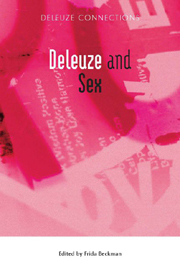Book contents
- Frontmatter
- Contents
- Acknowledgements
- Introduction: What is Sex?: An Introduction to the Sexual Philosophy of Gilles Deleuze
- 1 Alien Sex: Octavia Butler and Deleuze and Guattari's Polysexuality
- 2 Heterotica: The 1000 Tiny Sexes of Anaïs Nin
- 3 Haemosexuality
- 4 Disability, Deleuze and Sex
- 5 Tongue and Trigger: Deleuze's Erotics of the Uncanny
- 6 (Hetero)sexing the Child: Hans, Alice and the Repressive Hypothesis
- 7 The ‘Non-Human Sex’ in Sexuality: ‘What are Your Special Desiring-machines?’
- 8 Deleuze and Selfless Sex: Undoing Kant's Copernican Revolution
- 9 A Preface to Pornotheology: Spinoza, Deleuze and the Sexing of Angels
- 10 Encounters of Ecstasy
- 11 Beyond Sexuality: Of Love, Failure and Revolutions
- Notes on the Contributors
- Index
5 - Tongue and Trigger: Deleuze's Erotics of the Uncanny
Published online by Cambridge University Press: 12 September 2012
- Frontmatter
- Contents
- Acknowledgements
- Introduction: What is Sex?: An Introduction to the Sexual Philosophy of Gilles Deleuze
- 1 Alien Sex: Octavia Butler and Deleuze and Guattari's Polysexuality
- 2 Heterotica: The 1000 Tiny Sexes of Anaïs Nin
- 3 Haemosexuality
- 4 Disability, Deleuze and Sex
- 5 Tongue and Trigger: Deleuze's Erotics of the Uncanny
- 6 (Hetero)sexing the Child: Hans, Alice and the Repressive Hypothesis
- 7 The ‘Non-Human Sex’ in Sexuality: ‘What are Your Special Desiring-machines?’
- 8 Deleuze and Selfless Sex: Undoing Kant's Copernican Revolution
- 9 A Preface to Pornotheology: Spinoza, Deleuze and the Sexing of Angels
- 10 Encounters of Ecstasy
- 11 Beyond Sexuality: Of Love, Failure and Revolutions
- Notes on the Contributors
- Index
Summary
Statement
Joseph Bristow, in his book, Sexuality: The New Critical Idiom, challenges scholars to form a political project rooted in Deleuze's rhizomatic and schizoanalytic lines (Bristow 1997). My pedagogical and art-based project explores the possibilities of radical citizenship by actively cultivating vulnerability through corporeal inquiries. As a visual artist, my exhibitions have been repeatedly censored as a result of ambiguous representations and interpretations. Intended as strategies for social action, my work explores Deleuzian corporeal topologies. The creative and critical focus is on corporeal politics – in particular, vulnerability and the seemingly unfamiliar. Images and writings illuminate a call and response between anxiety and beauty: anxiety in the moment of recognising the uncanny, the familiar within the unfamiliar. Identifying a connection with the other, yet clinging to a separate identification, beauty inhabits the uncanny in the moment of response to our undeniable connectedness. The characters in my photographs and videos represent a Deleuzian simultaneity of inside and outside, of private and public, and play with the illusory distinctions between us and them, the familiar and the unfamiliar. My models simultaneously splay their bodies into the distance, like a smear or echo of memory, and compress themselves into the foreground, the tension of the present moment. I develop my visual work by finding natural and architectural sites that I relate to human gestures and psychological states. I then choreograph scenes set within these environments. What I see through the camera lens is my reality. My photographs show the viewer what is happening in front of the camera; nothing is manipulated during the analogue developing or printing process, which I do myself – now rare among contemporary colour photographers.
- Type
- Chapter
- Information
- Deleuze and Sex , pp. 106 - 116Publisher: Edinburgh University PressPrint publication year: 2011



